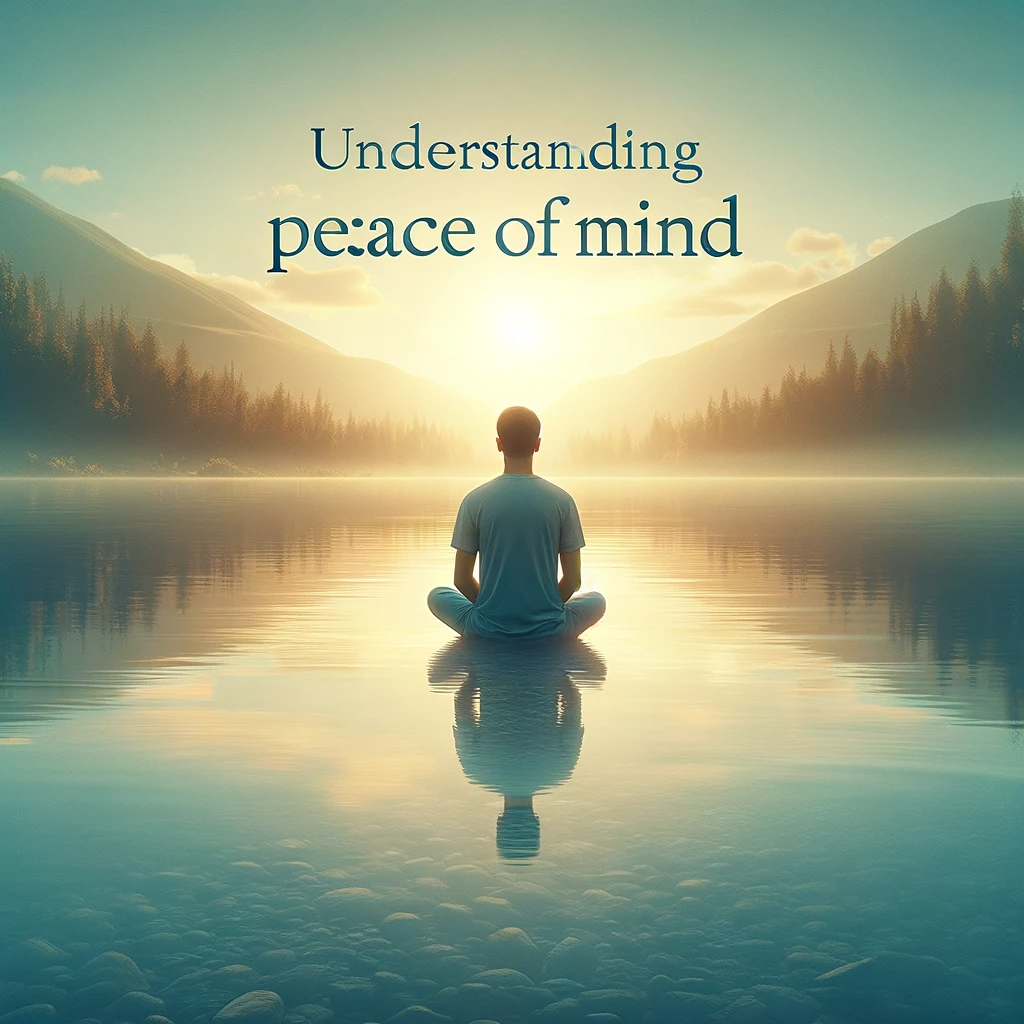Introduction: The Quest for Peace of Mind
In our fast-paced world, finding a moment of tranquility often feels like searching for a quiet corner in a bustling market. We all strive for that elusive state of calm, where our thoughts are still, and our minds are clear. But what does it mean to find peace of mind?
From juggling work deadlines to managing relationships, our daily grind can leave us feeling like we're in a perpetual state of catch-up. It's no wonder that we're on a continual quest for some mental respite. Yet, peace of mind is more than just a break from the chaos; it's a deep, sustaining sense of harmony that persists, even when life gets hectic.

Understanding Peace of Mind
Defining What Peace of Mind Means to You
So, what exactly do we mean when we talk about 'peace of mind'? It might conjure up images of quiet mornings with a cup of coffee before the world wakes up, or that feeling you get when you're curled up with a good book during a storm. But it's also more than these fleeting moments; it's a sustained sense of contentment that sticks around, even when things aren't picture-perfect.
For some, peace of mind comes from a sense of security, knowing that their basic needs are met and that they're on stable ground. For others, it's about feeling fulfilled, having meaningful relationships, or achieving personal goals. It's deeply personal, and understanding what it means for you is the first step towards attaining it. Have you ever taken a moment to think about what gives you that sense of peace?
The Psychological Perspective of Inner Peace
Psychologists might say that peace of mind is when our mind is free of worry and stress, but let's be real – when does that ever happen? We've got bills to pay, jobs to do, and families to care for. However, the goal isn't to eliminate these responsibilities; it's to change how we interact with them.
It's about finding that inner calm that helps us face life's ups and downs with a sense of resilience and grace. This doesn't mean we won't have bad days or that we won't feel stressed sometimes. But by cultivating a peaceful mindset, we're better equipped to handle these moments without losing our cool.
The Obstacles to Peace
External Stressors and Internal Turmoil
Let’s chat about what gets in the way of our peace of mind. Life's like that one friend who always brings drama, except you can't just ignore its texts. External stressors are all around us – traffic jams, work pressure, social media noise – and they can make our minds a noisy, crowded place.
But it's not just the outside world that's loud. Our inner critic can be pretty chatty too. It's that voice that tells you you're not doing enough, or that you should be better. It can keep you up at night going over past conversations or worrying about the future. We need to learn to turn down the volume on these internal rants if we want to find some quiet.
Recognizing Personal Triggers
Here’s a thought – what if we could spot those peace-stealers before they snuck up on us? We all have our triggers, things that hit a nerve and send our stress levels through the roof. Maybe it’s a cluttered house, a packed schedule, or a particular person who knows how to push your buttons.
Identifying these triggers is like having a map of where the landmines are. Once you know where they are, you can start finding ways to avoid them or, if you can't, to armor up with some stress-busting techniques. So, what sets you off? Take a minute to think about it.
Practical Strategies for Cultivating Peace
Mindfulness and Meditation Techniques
Now, how about we tackle some real stuff you can do to dial back the mental mayhem? Mindfulness – it's a buzzword for a reason. It's like giving your brain a chill pill. You can start simple: focus on your breath, pay attention to your meals, or just notice the world around you without judgment. It's all about being here, in the now, rather than lost in yesterday or worrying about tomorrow.
Meditation goes hand-in-hand with mindfulness. And no, you don’t need to sit cross-legged on a mountaintop (unless that's your thing). It’s about finding a quiet spot and just being with your thoughts. And hey, it's okay if your mind wanders to your to-do list or what to cook for dinner. The trick is to notice without getting frustrated and gently bring your focus back.
The Role of Physical Activity in Mental Serenity
Ever heard of a runner's high? You don't have to be a marathoner to get it. Physical activity releases endorphins, those feel-good chemicals that are nature's painkillers. Whether it’s a brisk walk, a dance party in your living room, or a few stretches, getting your body moving can be a powerful antidote to stress.
Creating a Peaceful Environment at Home
Your space reflects your mind. Clutter can lead to chaos in your head, so why not take some time to create a peaceful spot at home? It doesn't have to be a full-on Zen retreat – just a corner where you feel happy and calm. Add some plants, some comfy cushions, or pictures that make you smile. Make it your go-to peace nook.
Nurturing a Peaceful Mind Through Habits
Daily Routines for a Calmer Mind
Building habits that anchor your day can set the tone for calmer waters ahead. How about starting your morning without the phone glare? Instead, greet the day with a stretch or a favorite tune. And night routines are just as golden. Maybe a little winding down ritual, like a cup of herbal tea or jotting down thoughts in a journal, can help. It's these small habits that can build a fortress of tranquility in your mind.
The Power of Positive Thinking
"Think positive" might sound like a bumper sticker, but there's a science to back it up. Our brains have this thing called a negativity bias—it means we're wired to spot the bad stuff. Handy for dodging saber-tooth tigers, but not so great for our peace of mind. Counteract that by consciously focusing on the good. Gratitude lists, affirmations, or just recognizing a kind deed can flip the script in your head.
Overcoming Setbacks on the Path to Peace
Dealing with Unexpected Challenges
Life throws curveballs, and sometimes they hit us right in the gut. It could be a job loss, a breakup, or just a really bad day. These are the times when peace of mind feels like a distant dream. But it's also when we need it most. Remember, it's not about not having problems—it's about how you handle them. Take a breath, step back, and tackle issues one at a time. And it's okay to ask for help. We're all in this together, remember?
Learning from Difficult Experiences
Each challenge is a teacher, even if it's a strict one. What can you learn from these tough moments? Maybe it's resilience, maybe it's a new direction in life, or maybe it's just knowing what doesn't work for you. Reflect on these lessons, because they're the gems in the rough, the bits that add up to a wiser you.
The Journey of Self-Discovery
Connecting with Your Inner Self
The path to peace of mind is as much about understanding who we are as it is about managing what's around us. It’s about peeling back the layers, asking the hard questions, and greeting whatever you find with kindness. It might be taking up a new hobby, reflecting on your life's journey, or simply sitting with your thoughts for a while each day. This journey is about reconnecting with the parts of yourself that get lost in the daily shuffle.
Embracing Change for Personal Growth
And what about when life evolves? When you're not the person you were a year ago or even last week? That's growth, and it's something to celebrate, not fear. Embracing change is like saying yes to life's invitation to become more you. It's not always comfortable, but it’s always worth it.
Community and Relationships
The Influence of Social Bonds on Peace of Mind
Hey, we're social creatures, aren't we? Our peace of mind is often linked to the quality of our relationships. It's those Friday nights with friends, the family BBQs, and the coffee catch-ups. They ground us. But it's not just about quantity; it's the quality that counts. Nurturing relationships that are supportive and genuine contributes to our well-being in ways that are hard to measure but easy to feel.
Building Supportive Networks
And when the going gets tough, it's these networks that can be our lifelines. It's knowing you've got people who'll stand by you, who'll listen to your 3 AM worries without judgment. So, how about we invest a little more in these bonds? Send that text, make that call. Sometimes, a simple "How are you doing?" can mean the world.
Lifelong Pursuit of Peace
Adapting to Life’s Evolving Stages
Finding peace of mind isn't a one-time deal; it's a lifelong pursuit. As we move through life's stages, our needs, challenges, and sources of stress change. The peace we found in our 20s might look different in our 40s and beyond. Embrace this evolution. Each stage offers new opportunities to learn and grow in our understanding of peace.
Carrying Forward the Lessons Learned
The beauty is in the journey, not just the destination. The lessons we learn, the resilience we build, and the relationships we forge—these are the treasures we carry with us. They are our toolkit for peace, ready at hand for whatever life throws our way.
Conclusion
So, what have we chatted about today? We've explored the corners of finding peace of mind in a world that often feels like it's spinning too fast. We've talked about the importance of understanding ourselves, connecting with others, and building habits that support a calm mind.
Peace of mind is personal. It’s not just the absence of stress; it's the presence of something richer, something deeply rooted in who we are and how we relate to the world. It's a state of being that we cultivate and nurture, day by day, year by year.
Remember, it's okay to have days when peace seems like a distant memory. Those are the days to lean on your habits, your people, and the little practices that bring you back to the center. Keep at it, be patient with yourself, and take it one breath at a time. After all, the quest for peace of mind is one of the most rewarding journeys you can take.
And there you have it—a slice of life's wisdom pie served up in hopes that you find that elusive calm in the storm. Keep seeking, keep learning, and above all, keep finding those moments that give you a bit of peace in this wild, wonderful world.

